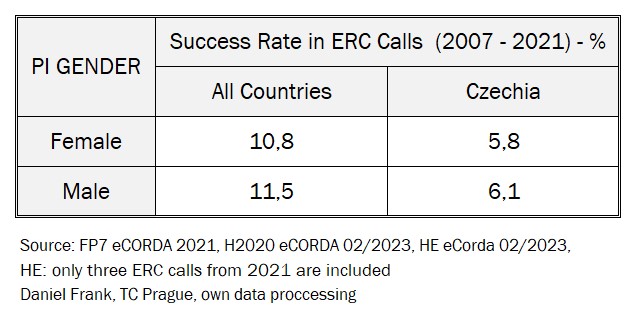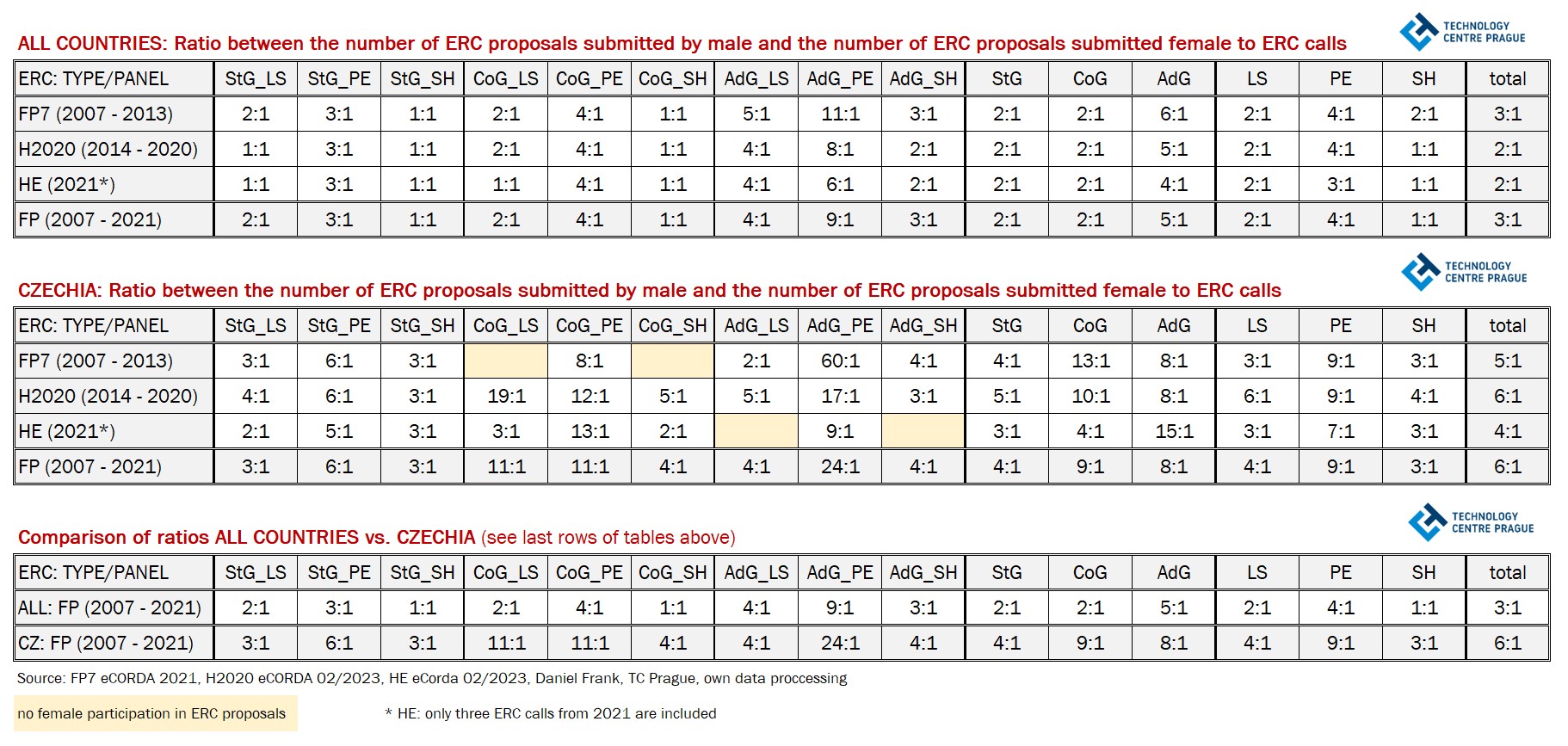MSCA Correspondence Analysis: from individual mobility to leading networks and programmes
27/01/2026
Although the success rate of the female researchers in submitting ERC grants in the FPs is almost identical to that of the male researchers at the global and national czech level in the long term (see Table 1), and the female researchers have at the global level almost the same success rate as the male researchers in the project proposals related to technical fields (8% vs. 10% - more detailed calculations by the author), their involvement in the preparation of ERC grants is much lower than that of their male colleagues.

Table1: Overall success rate of female and male PIs in ERC calls 2007-2021
While a gradual levelling out of the proportion of women as ERC grant applicants is evident at the global level, the situation regarding the higher involvement of female researchers in excellent research is not significantly improving in the Czech Republic, but rather stagnating. Table 2 shows the ratio of the number of project proposals submitted by male researchers to the number of project proposals prepared by female researchers. The ratios of project proposals submitted are processed and presented in the table at the level of:

Table 2: Ratio between the number of ERC proposals submitted by male and the number of ERC proposals submitted by female to ERC calls from 2007 to 2021
It is clear that the proportions of male and female project proposals submitted to ERC calls are in all cases more balanced and less pronounced at the global level (top part of Table 2) than at the Czech level (middle part of Table 2). In FP7, the ratio of project proposals submitted to ERC calls was 3:1 in favour of men, whereas in H2020 and at the beginning of Horizon Europe this ratio is now "only" 2:1. In the case of project proposals evaluated in the evaluation panels focusing on social and human sciences (SH), the final ratio of submitted project proposals is even 1:1 men vs. women. The largest difference in activity in the processing and preparation of project proposals for ERC calls between men and women is found in the field of physical sciences and other engineering disciplines (PE), where the long-term ratio of project proposal submissions is 5:1 in favour of male researchers. In this area, the long-term ratio of project proposals submitted is as high as 9:1 in favour of men for grants for experienced internationally recognised experts (AdG).
The differences in the number of project proposals submitted to ERC calls in the format of men vs. women, as already mentioned, are much larger and more pronounced in the case of the Czech Republic (see the middle part of Table 2). The ratio of the number of submitted ERC project proposals is 6:1 in Czechia in favour of men in the long term from 2007 to 2021. Unfortunately, this ratio is not improving significantly over time - FP7 5:1, H2020 6:1.
If, when assessing the global situation in FPs between 2007 and 2021, we defined the ratio of submitted ERC project proposals in the format of men vs. women in the field of physical sciences and other engineering disciplines (PE) as very significant, in the case of the Czech Republic the ratio between the number of submitted project proposals in this research area in the format of men vs. women is even more significant. The ratio of the number of physics- and technology-focused project proposals submitted to ERC calls was an astronomical 60:1 in favour of men in FP7. This ratio has risen to an equally discouraging 24:1 over the entire 14-year period. The imbalance in the submission of project proposals to ERC calls in the male vs. female scheme to the disfavour of women can be observed not only in project proposals aiming at AdG grants, but also in project proposals aiming at CoG grants, which are intended for senior postdocs. At the level of the Czech Republic, it can therefore be concluded that the more ERC grant schemes are directed towards more experienced researchers and the more they concern technical fields, the less women researchers are involved in their preparation. The gender balance is most balanced for ERC project proposals in the social sciences and humanities.
This generalisation corresponds in principle with the data from the She Figures 2021 study, Eurostat, the Czech Statistical Office and the findings of the NKC - Gender and Science of the Czech Academy of Sciences. The Czech Republic has one of the lowest shares of women in science and research of all EU member states [1,2,3, 4]. According to other information and data presented on the website of the NKC - Gender and Science, Czech research has not been able to provide opportunities for qualified women in the long term. The biggest gap in the proportion of women in the imaginary study-professional pathway is among PhD graduates and researchers. The representation of women is decreasing from the lecturer position towards the professor position. The biggest drop in the imaginary academic career path of women can be found among assistant and associate professors [1,2,3]. According to a study by the National Contact Centre - Gender and Science, although women are predominant at the master's level in universities, accounting for around 60%, in science and research, they make up only a quarter of the workforce. The lower representation of women among university academics and their more complex career paths in science seem to be some of the reasons for their low numbers among ERC grant applicants. The largest representation of Czech female researchers is in the medical sciences, almost half. On the other hand, only 15% of them can be found in technical fields [3]. Here, let us look for another reason for the low number of applications submitted by female researchers to ERC AdG calls, which are intended for experienced researchers in the physical sciences and engineering.
NKC - Gender and Science sees the improvement of the established rules for the awarding of financial grants as a way to remedy this unfavourable situation and to increase the representation of women in science and consequently the participation of women in ERC calls. Scientific institutions must now have a plan to ensure equal employment opportunities for men and women [3,5]. Statistics show that the research potential of women and men is essentially the same. It is just a matter of effectively removing some of the socio-economic barriers, such as those related to parenthood, which are often pointed out.
Author Daniel Frank, TC Prague, frank@tc.cz
The author is fully responsible for the formal and factual content of the article.
Publication and dissemination of the content of this article or its parts and attachments in Czech or any other language is only possible with mention and citation of the source.
Explanatory notes:
ERC StG - ERC Starting grants: Supporting excellent Principal Investigators starting their own independent research team or programme
Eligibility: Applicants should have been awarded their first PhD ? 2 and ? 7 years prior to 1st January of the call year, and must have already shown the potential for research independence and evidence of maturity, for example by having produced at least one important publication without the participation of their PhD supervisor.
ERC CoG - ERC Consolidator grants: Supporting excellent Principal Investigators consolidating their own independent research team or programme
Eligibility: Applicants should have been awarded their first PhD > 7 and ? 12 years prior to 1 January of the call year and must have already shown research independence and evidence of maturity, for example by having produced several important publications without the participation of their PhD supervisor.
ERC AdG - ERC Advanced granty Supporting excellent Principal Investigators at the career stage at which they are already established research leaders with a recognised track record of research
Eligibility: There are no restrictions on eligibility. ERC Advanced Grant Principal Investigators are expected to be active researchers and to have a track record of significant research achievements in the last 10 years which must be presented in the application.
Success rate: The success rate is calculated as the ratio of ERC grants funded to the number of all (eligible and ineligible) project proposals submitted to the relevant ERC calls
References:
[1] She Figures 2021 Gender Equality in Research and Innovation: Czechia. Evropská komise, 2021. [online] [cit. 20. 11. 2022]. Dostupné z: https://ec.europa.eu/info/sites/default/files/research_and_innovation/strategy_on_research_and_innovation/documents/ec_rtd_she-figures-2021-country-ficheczechia.pdf
[2] Eurostat - Share of women researchers, all sectors, online data code: TSC00006 last update: 21/10/2022 23:00, https://ec.europa.eu/eurostat/databrowser/view/tsc00006/default/table?lang=en
[3] Ženy ve vědě: data | NKC - gender a věda. NKC - gender a věda [online]. Dostupné z: https://genderaveda.cz/zeny-ve-vede/1
[4] Výzkumnice jsou v menšině | Statistika&My. Statistika&My | Magazín Českého statistického úřadu [online]. Copyright © Český statistický úřad [cit. 24.03.2023]. Dostupné z: https://www.statistikaamy.cz/2021/02/18/vyzkumnice-jsou-v-mensine
[5] Česko má nejmenší podíl žen ve vědě a výzkumu v Evropě. Změnit to můžou nová pravidla grantů | iROZHLAS - spolehlivé zprávy. iROZHLAS - spolehlivé a rychlé zprávy [online]. Copyright © 1997 [cit. 23.03.2023]. Dostupné z: https://www.irozhlas.cz/zivotni-styl/spolecnost/zeny-ve-vede-gender-rovnost-cesko-grantova-agentura_2302111950_gen
[6] Informace | Portál Horizont Evropa. [online]. Copyright © 2023 Technologické centrum Praha [cit. 23.03.2023]. Dostupné z: https://www.horizontevropa.cz/cs/struktura-programu-he/excelentni-veda/evropska-rada-pro-vyzkum/informace?storiesType=0
27/01/2026
22/12/2025
02/12/2025